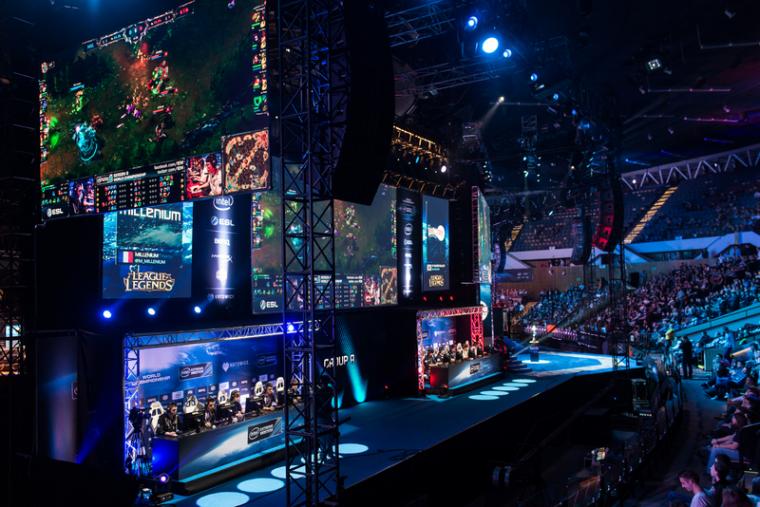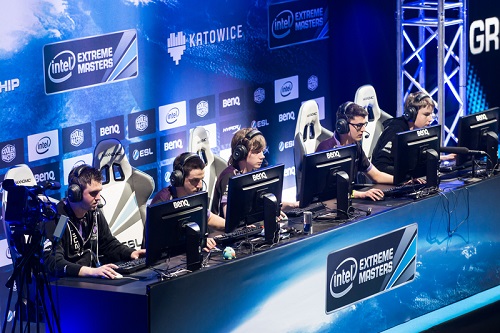
Back in 2018, TV viewers (and perhaps America as a whole) got a wake-up call on the popularity of esports as a reality TV series, The Gaming Life, followed a group of players trying to make a living with the game, Fortnite.
A year later, it was announced that Johnny Galecki (of The Big Bang Theory) was helming The Squad, a new sit-com about gamers.
The Gaming Life wasn’t renewed. There has been no news on The Squad (but considering it was announced just prior to the pandemic, maybe that’s not surprising).
Now, another show is cued up. It is a mockumentary (or perhaps mockuseries – pick your term) about an esports team (complete with personality clashes).
 The question, of course, is whether the show is actually relatable to audiences outside of gamers.
The question, of course, is whether the show is actually relatable to audiences outside of gamers.
As noted in Polygon, the show, Players, has a storyline that follows Fugitive Gaming, a fictional North American League of Legends team aspiring to win its first-ever championship. In addition to competitive dynamics, the story follows Creamcheese, one of the founders of Team Fugitive, and his struggles to bring a promising new player (Organizm) onboard.
Unfortunately, Organizm, for all his prodigy-level skills, is a teenager and is, well, difficult, to say the least. He is immature, self-centered, antisocial – and definitely not ready to be a team player. And with Creamcheese nearing the end of his own shelf life in terms of his skill, as well as his appeal to the masses, the conflicts are set like dominoes and ready to fall.
Team Fugitive’s new NBA ownership puts pressure on Creamcheese to get Organizm a spot in the starting lineup. Ego and personality clashes ensue, threatening the solidarity – and the success – of the team. The tensions are part of the storyline as Creamcheese tries to keep the peace with his teammates and regain his own rhythm while trying to help Organizm find his place – if, indeed, he can.
Yes, it’s scripted. But adding credibility to the show – and what may help achieve buy-in from esports enthusiasts who are the first line of potential viewers – is the fact that the show’s cast is a mix of actors and real-life gaming personalities.
Tony Yacenda, one of the show’s creators, told Polygon reporters he could not have imagined making an esports series (unless it was a comedy about misfits in the vein of the Big Bang Theory) – until he got immersed in the world of gaming and suddenly had an epiphany:
“And that was where I was like, Oh, I get it. This is a traditional sports story. You don’t need to have any context or even appreciation of pro gaming to understand that these two positions need to work together. And that is something that I felt was universal and could be like an engine for a general audience to invest into this team. To us, we talked about it, this is a love story between an ADC and a support.”
Note for those who don’t play: ADC is gamer-speak for 'attack damage carry,’ and according to the blog ESTNN, “it’s one of the most popular roles in League mainly because it is the role that promises players a late-game hyper-carry experience that deals insane amounts of damage, as long as they can pilot their champions.”
If you’re still struggling to understand the appeal of the show, Yacenda told Polygon reporters to refer back to the wildly popular Netflix original series, The Queen’s Gambit, which focuses on a character negotiating the world of competitive chess (as well as the real world). That show does not attempt to explain chess to the viewer, nor does it attempt to soft-pedal any of the main character’s shortcomings.
“We were so fortunate The Queen’s Gambit had just come out. They don’t dumb down that language at all, and it feels like the chess is super accurate. But we had no idea! I still don’t know what a Queen’s Gambit is, or what a Sicilian Defense is. But it’s the fact that they didn’t dumb down the language that it felt like the real thing, even though I didn’t know what they were talking about. I, as an audience, could appreciate that attention to detail. And we’re hopeful that a general audience will feel the same way. Because every time we’re talking about something League-related, it’s backed by something emotional and personal for the characters that I think should be easy to follow.”
The concept of a show based on (or loosely based on) an esports platform is (obviously) not new. But Players has to work to achieve muscle in the television space. Now, try to keep up here: CNBC has noted that Netflix has approved a new reality show based on Squidgame, which is based on a children's game that Netflix is already trying to make into a video game.
And there’s no doubt the audience is there, says Front Office Sports. The esports market is booming. It already has a larger audience than American football and rugby combined, according to Forbes. Furthermore, it has a worldwide following and is predicted to generate more revenue than both the UEFA Champions League and Formula 1 in 2022.

